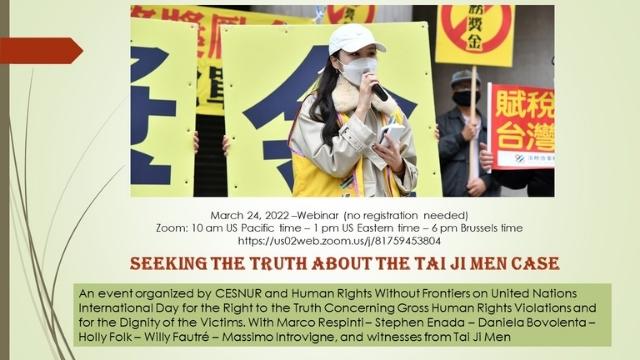In many parts of the world, minorities are repressed, and liberty is curtailed. Although Taiwan is a democracy, the Tai Ji Men case shows it also has problems.
by Holly Folk*
*A paper presented at the webinar “Seeking the Truth About the Tai Ji Men Case,” co-organized by CESNUR and Human Rights Without Frontiers on March 24, 2022, United Nations International Day for the Right to the Truth Concerning Gross Human Rights Violations and for the Dignity of the Victims.

I want to start by acknowledging the importance of Taiwan to the world, and the topical nature of this conversation and this meeting. I have visited Taiwan four times, and have come to love the country. Taiwan is a vibrant democracy, and its self-determination and autonomy need to be preserved.
Taiwan is not perfect, and like other countries still has problems, though being able to criticize the government should be read as a sign of the nation’s overall health. As in other places, conditions of bias can seep into political and legal decisions. The case of Tai Ji Men reverberates with an international pattern: when it comes to religious and spiritual minorities, bureaucratic decisions are often arbitrary, and courts often look the other way.
The situation between Ukraine and Russia has made the world aware of the global stakes regarding Taiwanese security. The vulnerability of Taiwan has rightfully been compared to the vulnerability of the countries on Russia’s border.
The case of Tai Ji Men, however, invites a different comparison between Taiwan and Russia, where religious minorities face frequent harassment and persecution. Like the Jehovah’s Witnesses and other groups in Russia, in Taiwan Tai Ji Men has endured selective prosecution for imaginary crimes, including confiscation of property.
Let me note, too, how the use of a “cult” or “xie jiao” framing has created a presumption of guilt against Tai Ji Men and other spiritual minorities.
Around the world right now we are seeing a global trend toward illiberalism. Fundamental civil liberties are being questioned. Many countries have endured two years of time when the right to assemble has been severely curtailed. In the United States, “Freedom of Religion” is sometimes being presented as merely “code for hate speech.”

Despite the trendiness of the word “intersectionality,” most people do not understand how connected different causes can be—or that one of the common unifiers is unfair treatment by oppressive governments.
In an American online magazine recently, the question was raised, “Why don’t religious conservatives working for religious freedom support the cause of LGBT rights?” This hit home for me with some irony. I support both causes and believe, as they say in the United States, that it is possible to “walk and chew gum at the same time” (i.e., to do at the same time two things that are in fact not mutually exclusive). And in my work on religious freedom, I have consistently called attention to the shared interests of groups with different points of view.
In Russia, China, and other countries where religion is restricted, the tactics applied against religious minorities are almost invariably also used against secular political groups—especially environmentalists, human rights activists, and people working for LGBT emancipation. Religious freedom is imbricated with secular civil liberties. Regardless of an individual’s personal faith, it is a cause that should concern us all.
I hope the courts and government in Taiwan would consider the implications of allowing the arbitrary treatment of Tai Ji Men to stand. Around the world right now, many people fear events are spinning out of control. Governments have a responsibility to their citizens to preserve civil society and equal justice under the law. This is not less true for Tai Ji Men that it is for many other situations.
Source: Bitter Winter

